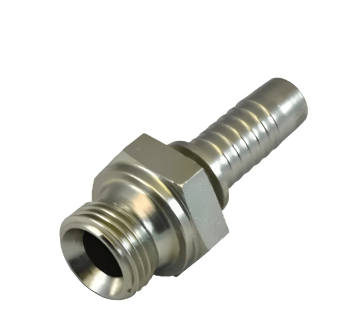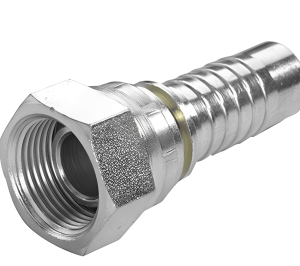In the intricate world of hydraulic systems, where precision reigns supreme, the choice between male and female hydraulic fittings becomes a pivotal decision. These fittings, despite their unassuming appearance, play a decisive role in ensuring the smooth operation and efficiency of hydraulic machinery. This comprehensive guide navigates through the nuances of male and female hydraulic fittings, delving into the differences between them, and highlighting the main types that drive hydraulic systems forward.
What is the Difference Between Male and Female Hydraulic Fittings
The distinction between male and female hydraulic fittings is not merely semantic; it underscores the mechanics of hydraulic connections. Understanding this distinction is paramount to constructing a hydraulic system that performs optimally:
Male Hydraulic Fittings
Male hydraulic fittings are characterized by their protruding end that features threads on the exterior. This threading is designed to fit into the corresponding female fitting. Male fittings play a vital role in the assembly process, providing a secure point of connection that ensures fluid transmission.
Female Hydraulic Fittings
Female hydraulic fittings, on the other hand, feature an interior threading that allows them to accommodate the male fittings. These fittings serve as the receptacles for male fittings, creating a sealed connection that prevents leaks and maintains the integrity of the hydraulic system.
What are the Main Types of Hydraulic Fittings
The world of hydraulic fittings is diverse, accommodating various needs and preferences. Among the main types of fittings, a few stand out as key players in hydraulic systems:
1. NPT (National Pipe Taper) Fittings
NPT fittings, characterized by their tapered threads, are a common choice due to their simplicity and effectiveness. Their self-sealing mechanism ensures a tight connection, making them prevalent in various industries.
2. JIC (Joint Industry Council) Fittings
JIC fittings boast a 37-degree flare that creates a reliable seal without the need for excessive tightening. Their ease of assembly and reusability have earned them a significant place in hydraulic systems.
3. ORFS (O-Ring Face Seal) Fittings
ORFS fittings utilize an O-ring to create a robust seal, making them ideal for high-pressure environments. Their effectiveness in preventing leaks and their resilience make them indispensable in demanding applications.
Matching Male and Female Fittings: A Harmonious Union
In the realm of hydraulic systems, the connection between male and female fittings is a dance of precision. Ensuring compatibility and proper pairing of these fittings is essential to maintain fluid flow, prevent leaks, and uphold the system’s efficiency. The threads, size, and type of fittings must align seamlessly to create a harmonious union.
Applications and Industries
The applications of male and female hydraulic fittings span across a myriad of industries:
1. Construction
In construction, hydraulic systems operate heavy machinery such as cranes, excavators, and bulldozers. Properly paired male and female hydraulic fittings ensure the precision and efficiency required for these operations.
2. Manufacturing
The manufacturing industry relies on hydraulic systems for various processes, from shaping materials to assembly lines. Accurate connections between male and female fittings are vital for seamless production workflows.
3. Agriculture
Agricultural machinery, from tractors to irrigation systems, depends on hydraulic systems. Male and female fittings enable these systems to function flawlessly, contributing to efficient and productive farming practices.
Choosing the Right Fittings: Efficiency Unleashed
Selecting the appropriate male and female hydraulic fittings is not a decision to be taken lightly. It directly impacts the system’s performance, safety, and longevity. Proper sizing, threading, and type selection are pivotal to achieving optimal efficiency and preventing potential issues.
Final Say
The world of hydraulic systems operates on precision and synergy, and at its core, lies the interaction between male and female hydraulic fittings. These seemingly unremarkable components hold the power to dictate the system’s success or failure. The distinction between male and female fittings, their specific characteristics, and compatibility are the bedrock upon which hydraulic efficiency is built.
Post time: Aug-25-2023



